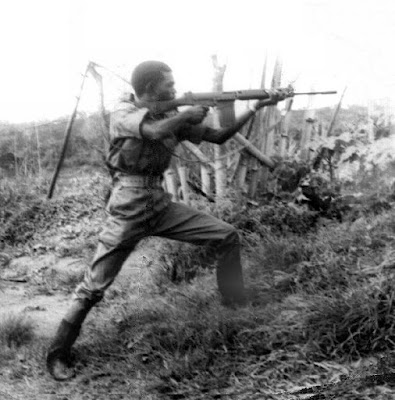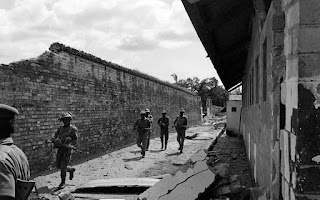Thinking Of Biafra In Inner-City Dublin
Dublin, Ireland resident sell used clothes with proceeds to benefit the Children of Biafra. Date: July 25, 1968. Image: Dermot O'Shea/Irish Times
In the late 1960s Irish people were much moved by the suffering caused by war in the breakaway Nigerian state of Biafra. So when a famine appeal was launched, there was an extraordinary outpouring of generosity.
“Workers all over the country,” this news story from the summer of 1968 reported, “are offering their overtime earnings and their first week’s salary increases.”
It added that the Joint Biafra Famine Appeal, launched by the Catholic and Anglican Bishops of Owerri, had increased in just one week from £28,820 to £46,758.
The people in the picture were running a daily jumble sale at the corner of Luke Street and Townsend Street in Dublin which, on its first day of operation, had raised eight pounds, fifteen shillings and fourpence.
The organiser, Mrs Theresa Byrne of Luke Street, told The Irish Times: “We felt so sorry for the poor children that we set up this secondhand sale of clothes, books and anything else the neighbours have donated.”
The donators, the reporter noted, were also the customers. As for the stall itself, it’s the most down-to-earth enterprise you’ll ever see: a table has been placed on the footpath, and the goods for sale are either placed on it or hung over the railings behind.
The customers are enthusiastic, but orderly. The young women at the front are having a good look at what’s on offer, scrutinising the merchandise with expert eyes. If the style of the girl closest to the camera is anything to go by, these ladies aren’t going to wear just any old thing.
The boys, it must be said, don’t look overly impressed. Neither does the dog.
It was, however, an impressive initiative by this tiny local community whose members didn’t have a huge amount – either of clothes or of cash – to spare. Something to think about in a world where it often seems that tiny local actions don’t make a ha’-pence worth of difference.
SOURCE: THE IRISH TIMES




Comments